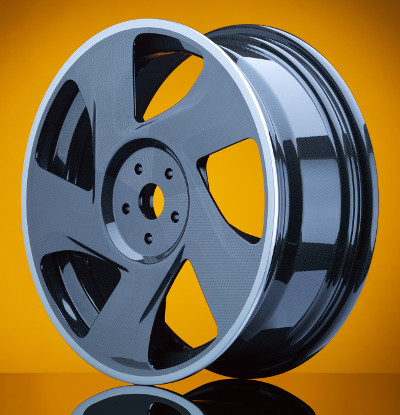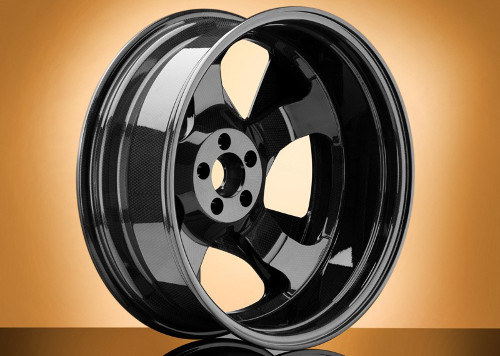 |
| September 02, 2014 | Volume 10 Issue 33 |
Designfax weekly eMagazine
Archives
Partners
Manufacturing Center
Product Spotlight
Modern Applications News
Metalworking Ideas For
Today's Job Shops
Tooling and Production
Strategies for large
metalworking plants
Wheels:
SABIC, Kringlan developing world's first thermoplastic carbon composite wheel

They're on a roll, and they're almost there. Polymers juggernaut SABIC along with the Swiss company Kringlan Composites AG and industry partners such as TenCate are working to further advance the development of the world's first carbon fiber-reinforced thermoplastic wheel for cars and trucks.
This innovation leverages SABIC's proprietary ULTEM resin and Kringlan's proprietary three-dimensional carbon-composite design, prototyping, and manufacturing capabilities to create a solution that can be used to replace traditional materials, such as metal and aluminum alloys. The aim is to help reduce weight and emissions and potentially save manufacturing costs across industries from aerospace to automotive to consumer goods.
Lightweighting has always been a passion of Kringlan Composites founder and COO Dr. Niccolo Pini, from road bikes to mountain bikes, skis to cars. Pini, a materials engineer, started Kringlan directly after completion of his PhD on smart materials at the Swiss Federal Institute of Technology in Zurich (ETHZ) in 2007. From the beginning, the goal of his company has been to spread the application of high-performance thermoplastic composites, with the prime example being a thermoplastic carbon wheel. Pini has made marked technology advances in materials development over preforming, press technologies, and new joining methods. The second generation of Kringlan's wheel concept was successfully tested in 2013.
When comparing how much lighter his carbon composite wheel is than the metal ones currently on the market, "A good number is 30 to 40 percent compared to light alloys," Pini says.
Kringlan's technology was described in a Compsites World (September 2013) write-up as including, "a single-shot rim and a spoke module that is assembled and bonded separately before integration with the rim," with a manufacturing process based on press molding that "produces one wheel every 10 minutes."

To advance the wheel's development, Kringlan and SABIC have been working on a prototype for a German automotive manufacturer. The wheel is strong, light, and stunning in design.
Not only can emissions associated with the vehicle's use-phase be reduced (because the wheel is so much lighter), the wheel can also be manufactured with less environmental impact compared to conventional processes and offers full system recyclability.
"The life cycle of our wheel is comparable to that of metal parts," says Pini. "After end of life, we can fully recycle our wheels -- material-wise! -- and manufacture other carbon products out of it, respectively some of the wheel components themselves."
The design of the part also provides the flexibility for the wheel to be mounted with traditional metal spokes, or spokes with carbon fiber-reinforced ULTEM resin composites.
"When compared to other thermoplastic materials, the ULTEM resin composite concept offers superior strength at high temperatures, dimensional stability, as well as resistance to chemicals," says Thierry Materne, Vice President, Technology & Innovation for SABIC's Innovative Plastics business.
The full composite wheel design complies with current standards set for metal wheels by the German testing institute TUV, enhancing the opportunity to work with additional global automotive OEMs for the prototyping of lightweight wheels according to their specific design and specifications.
"Our carbon wheel is at least as durable as a metal one," says Pini. "The projected lifetime corresponds to the standard lifetime for wheels in the automotive [sector], approximately 300,000 km."
"There are some tests where our wheel dramatically improves the performance compared to light alloy wheels -- in particular, crash tests," he adds.
But will the public buy it?
"I feel the acceptance from the general public being better than that of some car manufacturers," says Pini. "Many customers have already experienced the advantages of carbon composite, e.g., in sporting goods, and are more open to this class of products."
It's the OEMs that are slow on this one.
"The car manufacturers are still a bit more difficult to convince," says Pini, "because our technologies are still very new, and not everyone is fully understanding it ... yet."
But several OEMs have shown interest in the carbon composite wheel application, which can also enable the reduction of CO2 from a passenger car by two to three percent, according to Kringlan CEO Steffen Heinecke.

While the first application of this new technology is being driven in the automotive industry, its potential reach extends to multiple industries where weight reduction is a key driver.
In consumer appliances, OEMs are focused on designing their products to achieve energy efficiency certifications. With this carbon fiber composite using ULTEM resin, appliance OEMs can replace metal with a lighter and equally strong technology, which can help to reduce the amount of energy used during operation and contribute to the energy-efficiency performance required for certification.
In washing machines, for example, this new three-dimensional carbon fiber composite technology can reduce the inertia, the amount of energy needed, to start the machine drum moving, compared to current metal alternatives, which can mean greater efficiency and potentially a lower carbon footprint for the machine. Additionally, by considering the use of the ULTEM resin-based carbon fiber composites with Kringlan's manufacturing technology, appliance manufacturers can potentially save costs by reducing the number of secondary operations required to develop key parts.
Sources: SABIC, Kringlan Composites
Published September 2014
Rate this article
View our terms of use and privacy policy
